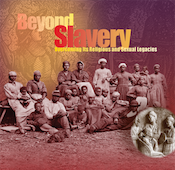Beyond Slavery
Explore the Conference
Explore the Conference by Subject
Slavery in Christian, Jewish, and Muslim Scripture and Religious Law
Christianity, Religion of the Slaveholders and the Enslaved
Sexual Assault and Exploitation Under U.S. Slavery and Jim Crow
How Slavery Has Shaped Our Understandings of Marriage and Friendship
Slavery, Violence, and the State
Beyond Slavery:
Overcoming Its Religious
& Sexual Legacy
Adrienne Davis:
Sexual Reparations
for Slavery
African Americans have tried to obtain reparations for slavery since the nineteenth century. Many leaders supported them throughout the twentieth century, including W.E.B. Du Bois and Queen Mother Audrey Moore. Taken together, the systematic political repression, economic discrimination, racial abuses of the criminal system (including blacks as both victims and defendants), brutal rending of black families, forced health experiments while denying basic healthcare, repression of literacy, and access to education warrant recognition and monetary reparation.
Paying reparations would make us partners with others worldwide who condemn slavery and be a step toward making Blacks real citizens in America. However, even with all of the recent writing on reparations, we still have not really grappled with the question of sexual reparations. Religious communities are particularly well poised to exercise leadership on this question. Religious leaders and institutions are especially powerful over matters regarding women, families, and sexuality.
Yet, historically, mainstream religion, with few exceptions, refused to condemn, or even address or recognize, sexual abuses under slavery. Even in the face of public pro-slavery defenses of slavery, religious leaders remained largely silent, supporting slavery and its sexual injustices. The contemporary reparations debate offers religious institutions a second chance. They can exercise leadership in bringing reparations to public attention and also draw on their moral influence in the area of sexuality to insist especially that slavery's sexual injustices receive equal attention.
This video was recorded on October 15-16, 2006 as part of the conference, "Beyond Slavery: Overcoming Its Religious and Sexual Legacy." It was sponsored by the Feminist Sexual Ethics Project in the Near Eastern and Judaic Studies Department at Brandeis University.
